新概念英语第一册Lesson55
新概念英语第一册lesson55-56(推荐完整)

housework n.家务
Do you often do housework at home? clean the floor / wash the dishes cook dinner
lunch 午饭 breakfast supper dinner(较正式,一般指晚宴) meal [mi:l] 餐 have a big meal
Analyze of the passage
take Please take me with you. take care / take good care of take away see friends visit friends from 从…
from 从……
He is from Sweden. back from work I just back form GZ. then 然后 I always eat, then go the bed. and then First, open your book, and then… 先听录音,然后回答问题。
afternoon 下午
noon 中午,正午 = midday at noon = at midday 在正午 in the morning in the afternoon in the evening at night/noon I often watch TV at night.
usually adv.通常
Key Structures
1.Mr. Sawyer stays at home every day. 2.She always eats her lunch at noon. 3.She usually sees her friends. 4.They often drink tea together. 5.The children always do their homework 6. Mr. Sawyer usually reads his
新概念英语第一册55课教案
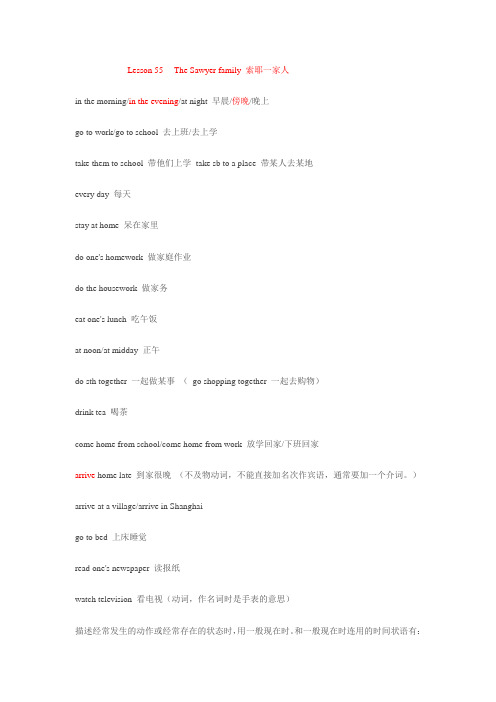
Lesson 55 ---The Sawyer family 索耶一家人in the morning/in the evening/at night 早晨/傍晚/晚上go to work/go to school 去上班/去上学take them to school 带他们上学take sb to a place 带某人去某地every day 每天stay at home 呆在家里do one's homework 做家庭作业do the housework 做家务eat one's lunch 吃午饭at noon/at midday 正午do sth together 一起做某事(go shopping together 一起去购物)drink tea 喝茶come home from school/come home from work 放学回家/下班回家arrive home late 到家很晚(不及物动词,不能直接加名次作宾语,通常要加一个介词。
)arrive at a village/arrive in Shanghaigo to bed 上床睡觉read one's newspaper 读报纸watch television 看电视(动词,作名词时是手表的意思)描述经常发生的动作或经常存在的状态时,用一般现在时。
和一般现在时连用的时间状语有:every day/at night/in the morning/in the afternoon/in the evening 经常连用的副词:usually/often/sometimesWhat do/does --- usually do? 某人通常做什么?breakfast/lunch/supper 早饭/中饭/晚饭The Sawyer s live at 87 King Street.姓氏后加s,前加定冠词the,表示某某一家人(the Smiths/the Johnsons)。
新概念英语第一册第55课

• nnigighhtt 一n般. 指夜夜间里 • 晚安 • good night • 在夜里 • at night • 一整夜 • all night • =the whole night • He always does his
stay with sb和某人呆在一起。 她总是和我呆在一起。
eg: She always stays with me.
欧姆龙贸易(上海)有限公司
home
n. 家 ;adv. 住家,到家 1) n. 家 欢迎来我家
eg: Welcome to my home . 在家
at home 呆在家
stay at home 她总是呆在家
• •
我W们e 通u常su在aulls家yuad做loly我ou们r 的hao家dmv庭e.w作通or业常k 。at
home .
• 她通常在晚上打扫房间。
• eg: She usually cleans her room in the evening .
• together adv. 一起
• 一起做某事
She always eats her lunch at noon 。(在正午)
欧姆龙贸易(上海)有限公司
In the afternoon, (在下午 )
she usually sees her friends 。
他总是会见他的朋友 They often drink tea
together.
他们经常在一起喝茶
新概念英语第一册Lesson-55-56 The Sawyer family

n. 下午
New words
usually together evening arrive night
['juʒuəli] [tə'geðə] ['iːvnɪŋ] [ə'raɪv] [naɪt]
adv. 通常 adv. 一起 n. 晚上 v. 到达 n. 夜间
New words
• 形容词性物主代词具有形容词的特性,常放在名词前面作定语, 表明该名词所表示的人或物是\谁的\或xx belongs to sb.
lunch n.午饭
eat lunch = have lunch 吃午饭 一日三餐前的冠词必须省略,而且,表示吃饭的“吃”
既可用 eat ,也可用 have 吃早饭 eat(have) breakfast 吃晚饭 eat(have) supper(英)
eat(have) dinner (美)
morning n.早上
The text
3
Let’s learn the dialogue:
First listen to the tape and answer this question.
When do the children do their homework?
When do the children do their homework? At night, before they go to bed.
此段使用的是哪个时态? 上文中出现了几个动词?分别是哪些?
这些动词的共同点是什么?
一般现在时
• 1.定义:表示经常反复发生的动作或存在的状态。 • 2.标志词:often usually sometimes always never
新概念英语第一册Lesson55

• home the from come children school. • The children come home from school. • They arrive home early.(变成一般疑问句) • Do they arrive home early? • Mr. Sawyer comehsome from work. • He arrives home late. (变成一般疑问句) • Does he arrive home late? • children always the their do homework. • The children always do their homework. • 孩子们总是做作业。 • Mr. Sawyer usually reads his newspaper. • 索耶先生总是读报纸。
m shareful
您身边的小升初英语专家----鑫鹏学校新概念部
New lesson
• The Sawyer live at 87 King Street.
• In the morning, Mr. Sawyer goes to work and the children go to school.
• She usually see(ssee) her friends.
• often they together tea drink. (重新排序) • They often drink tea together.
m shareful
您身边的小升初英语专家----鑫鹏学校新概念部
课文再现-英汉互译/句型转换
m shareful
您身边的小升初英语专家----鑫鹏学校新概念部
m shareful
新概念英语单词第1册Lesson55:TheSawyerfamily

新概念英语单词第 1 册Lesson55 :TheSawyerfamilylive [liv] v .住,生活【派生词】living 生计【单词扩充】life 生活alive 活着的【单词搭配】live on... 靠..... 生活【单词例句】A:Who lives with you?A:你和谁住在一起?B:Kate and Nancy do.B:我跟凯特和南希一起住。
stay [stei] v 停,逗留【单词扩充】stop over 中途停留【单词搭配】stay at home 待在家stay still 静止不动stay out of 不参与stay up 熬夜【单词例句】A:How long do you plan to stay here?A:你打算在这儿停留多久?B:I will stay here for about ten days.B:我将在这儿待大概10天。
home [hum] n. 家;adv 在家,至U家【派生词】homeland 祖国【单词搭配】at home 在家go home 回家【单词例句】A:I must go back home where many things are waiting for me to settle.A:我必须回家了,很多事正等着我去处理。
B:We're very sorry to see you go.B:您要走了,我们感到非常遗憾。
housework['haswk] n. 家务【单词构造】house (房子)+work (工作)二housework (家务)【单词搭配】do the housework 做家务【单词例句】A: My mother always says I spend too much time on watching TV. A:我妈妈总是说我把太多的时间花费在看电视上。
B: Then you should finish your homework, and then help your parents with the housework some day.B:那你以后应该先完成家庭怍业,然后帮父母做些家务。
新概念英语第一册自学笔记含课后练习答案:Lesson55-56
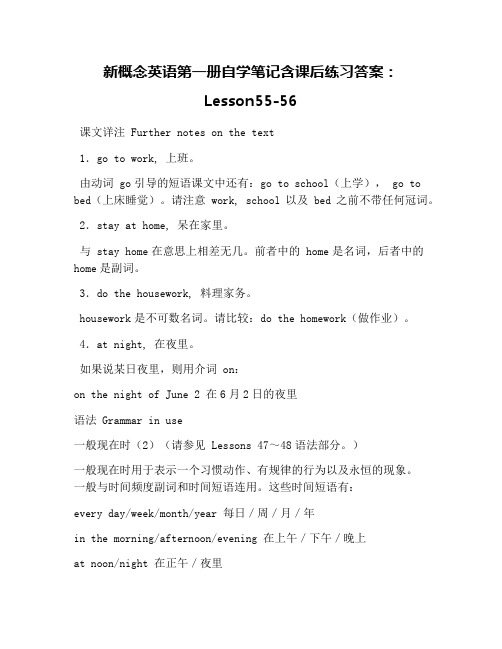
新概念英语第一册自学笔记含课后练习答案:Lesson55-56课文详注 Further notes on the text1.go to work, 上班。
由动词 go引导的短语课文中还有:go to school(上学), go to bed(上床睡觉)。
请注意 work, school以及 bed之前不带任何冠词。
2.stay at home, 呆在家里。
与 stay home在意思上相差无几。
前者中的 home是名词,后者中的home是副词。
3.do the housework, 料理家务。
housework是不可数名词。
请比较:do the homework(做作业)。
4.at night, 在夜里。
如果说某日夜里,则用介词 on:on the night of June 2 在6月2日的夜里语法 Grammar in use一般现在时(2)(请参见 Lessons 47~48语法部分。
)一般现在时用于表示一个习惯动作、有规律的行为以及永恒的现象。
一般与时间频度副词和时间短语连用。
这些时间短语有:every day/week/month/year 每日/周/月/年in the morning/afternoon/evening 在上午/下午/晚上at noon/night 在正午/夜里第3人称单数的谓语动词需加以变位,这可分为几种情况:(1)直接加 -s,如:come----comesarrive----arrives(2)以 -sh, -ch, -o 以及 -s结尾的动词加 -es,如:wash----washesgo----goeswatch----watchesdo----does(3)以辅音加 -y结尾的动词,把 -y改成 -i,再加 -es;而元音加-y结尾的动词,只加 -s即可:hurry----hurriescarry----carriesplay----playsstay----stays词汇学习 Word study1.arrive v.(1)到达;到来:We arrived home early. 我们很早就到家了。
新概念英语第一册Lesson 55 The Sawyer family

• Watch the video and answer the question.
• When do the children do their homework?
• 索耶一家住在国王街87号、
• 早上,索耶先生去上班,孩子们去上学。父亲每天送孩 子们去上学。
Jimmy doesn’t have lunch at home
3.My father usually reads newspapers in
the morning.(对划线部分提问)
What does your father usually do in the morning?
4.She often does her homework at night.(改一般疑问 句)
(read) • 8. We are going ______ the flowers to the teacher.
(send) • 9. I can’t go now. I must ______ my homework. (do) • 10. Look, they ______ (work) hard.
A. Do, watch B. Does, watches C. Does, watchs D. Does, watch
1.My sister often goes to school on foot. (对划线部分 提问) How does your sister go to school?
2.Jimmy has lunch at home.(改成否定句)
Greece. (come) • 4. The father ______ his children to school now. (take) • 5. Mrs. Smith ______ at home every day. (stay) • 6. The girl can ______ the vase on this table. (put) • 7. Mr. Sawyer usually ______ his newspaper at night.
新概念英语第一册Lesson55-56笔记(语法点+配套练习+答案)
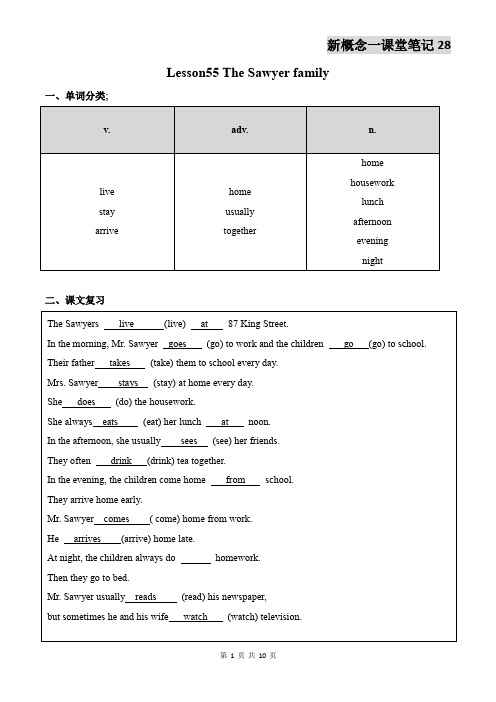
nightn.夜间
atnight在晚上
atnoon在中午
The koala sleepsinthe day and movesatnight.
I don’t go homeatnoon.
The Sawyer family
live at +小地点
living thing生物
living way生活方式
life n.生活,生命
I liveat58 Huanghe Road.
He livesinEngland.
The old man likes livinginthe country.
Different people have their differentliving ways .
The baby like stayingwithits mother.
Get up! Don’t stayinbed.
home
n.家
adv.在家,到家
at home在家
stay at home呆在家
go home回家
arrive home到家
I have a beautifulhomein Zhangzhou.(n.)
看电视
at noon
在中午
make the bed
铺床
in the afternoon
在下午
wash the dishes
刷盘子
at night
在晚上
type a letter
打信
5、语法解析
1.一般现在时
定义:1.(fact)客观事实或客观真理
新概念英语第一册55-56课详解

新概念英语第一册55-56课详解Lesson 55-56 of New Concept English Book 1 Detailed Explanation.Lesson 55: The Sawyer Family.Vocabulary and Expressions:live [lɪv] v.: This verb has multiple meanings. Firstly, it can mean to reside or habitually inhabit a place. For example, "I live in Hefei." Secondly, it can mean to exist or be alive, as in "People cannot live without air." Lastly, it can be used in the expression "live a/an... life" to describe the way someone lives their life.stay [steɪ] v.: This Verb primarily means to remain in a place for a period of time. It can also be used figuratively to mean "remain" in a certain state or condition, as in "stay hungry, stay foolish."home [həʊm] n./adv.: As a noun, it refers to the place where one lives. As an adverb, it means "to the place where one lives," as in "go home."housework ['haʊswɜːk] n.: This noun refers to the tasks related to maintaining a household, such as cleaning, cooking, and laundry.lunch [lʌnʃ] n.: This noun refers to the meal eaten in the middle of the day.afternoon [ɑːftə'nuːn] n.: This noun refers to the period of time between noon and evening.Text Explanation:Lesson 55 introduces the Sawyer family and their daily routine. The lesson begins by introducing the family members and their occupations. Mr. Sawyer works in an office, while Mrs. Sawyer stays at home. The children go to school. The lesson then goes on to describe their eveningactivities. Mr. Sawyer usually arrives home from work at about five o'clock, and the family then has their lunch together. In the afternoon, they often have a rest, andthen in the evening, they usually stay at home and watch television.Grammar Points:The use of "-s" or "-es" to form the third-person singular present tense of verbs is reinforced in this lesson. For example, "Mr. Sawyer usually arrives home from work at about five o'clock."The use of prepositions with "live" is also introduced. For example, "Mr. Sawyer lives in a town near London,"where "in" is used with a large place, and "Mrs. Sawyerlives at 87 King Street," where "at" is used with aspecific address.Lesson 56: What Do They Do?Vocabulary and Expressions:together [tə'geðə] adv.: This adverb means "in a group" or "side by side."evening ['iːvnɪŋ] n.: This noun refers to the time of day that comes after afternoon and before night.arrive [ə'raɪv] v.: This Verb means to reach a destination after a journey.night [naɪt] n.: This noun refers to the period of time from sunset to sunrise.Text Explanation:Lesson 56 continues the theme of the Sawyer family's daily life by asking the question, "What do they do?" The lesson provides information about the family's evening activities. Mr. Sawyer usually arrives home from work at about five o'clock, and then the family has their tea together. After tea, they usually sit in the living room and watch television. Sometimes, they go to the cinema orto the theater. On Sundays, they often go for a walk in the park.Grammar Points:The present tense of verbs is reinforced in this lesson, particularly the use of the third-person singular form.The lesson also introduces the use of modal verbs such as "can" and "usually" to express ability and frequency.Conclusion:Lessons 55 and 56 of New Concept English Book 1 focus on the Sawyer family's daily routine and activities. These lessons introduce new vocabulary and expressions related to family life, daily activities, and grammar points such as the use of "-s" or "-es" in the third-person singular present tense and the use of modal verbs. By learning these lessons, students can improve their understanding of family life in English-speaking countries and enhance theirlanguage skills in areas such as vocabulary, grammar, and comprehension.。
新概念英语单词第1册Lesson55:The Sawyer family
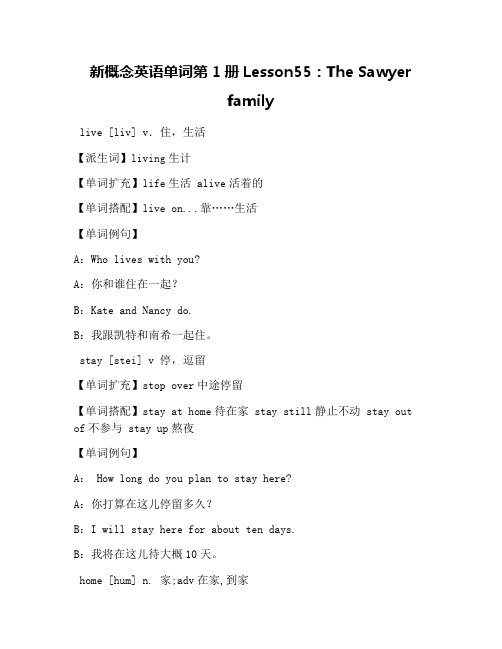
新概念英语单词第1册Lesson55:The Sawyerfamilylive [liv] v.住,生活【派生词】living生计【单词扩充】life生活 alive活着的【单词搭配】live on...靠……生活【单词例句】A:Who lives with you?A:你和谁住在一起?B:Kate and Nancy do.B:我跟凯特和南希一起住。
stay [stei] v 停,逗留【单词扩充】stop over中途停留【单词搭配】stay at home待在家 stay still静止不动 stay out of不参与 stay up熬夜【单词例句】A: How long do you plan to stay here?A:你打算在这儿停留多久?B:I will stay here for about ten days.B:我将在这儿待大概10天。
home [hum] n. 家;adv在家,到家【派生词】homeland祖国【单词搭配】at home在家 go home回家【单词例句】A:I must go back home where many things are waiting for me to settle.A:我必须回家了,很多事正等着我去处理。
B: We're very sorry to see you go.B:您要走了,我们感到非常遗憾。
housework['haswk] n.家务【单词构造】house(房子)+work(工作)= housework(家务)【单词搭配】do the housework做家务【单词例句】A: My mother always says I spend too much time on watching TV.A:我妈妈总是说我把太多的时间花费在看电视上。
B: Then you should finish your homework, and then help your parents with the housework some day.B:那你以后应该先完成家庭怍业,然后帮父母做些家务。
新概念英语第一册第55-56课-The Sawyer family
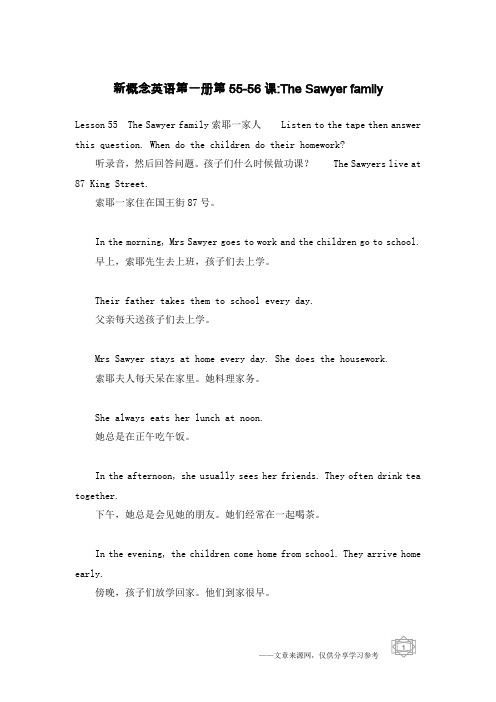
新概念英语第一册第55-56课:The Sawyer familyLesson 55 The Sawyer family索耶一家人Listen to the tape then answer this question. When do the children do their homework?听录音,然后回答问题。
孩子们什么时候做功课?The Sawyers live at 87 King Street.索耶一家住在国王街87号。
In the morning, Mrs Sawyer goes to work and the children go to school.早上,索耶先生去上班,孩子们去上学。
Their father takes them to school every day.父亲每天送孩子们去上学。
Mrs Sawyer stays at home every day. She does the housework.索耶夫人每天呆在家里。
她料理家务。
She always eats her lunch at noon.她总是在正午吃午饭。
In the afternoon, she usually sees her friends. They often drink tea together.下午,她总是会见她的朋友。
她们经常在一起喝茶。
In the evening, the children come home from school. They arrive home early.傍晚,孩子们放学回家。
他们到家很早。
Mr Sawyer comes home from work. He arrives home late.索耶先生下班回家。
他到家很晚。
At night, the children always do their homework. Then they go to bed.晚上,孩子们总是做作业,然后去睡觉。
新概念英语第一册Lesson55课后练习册答案
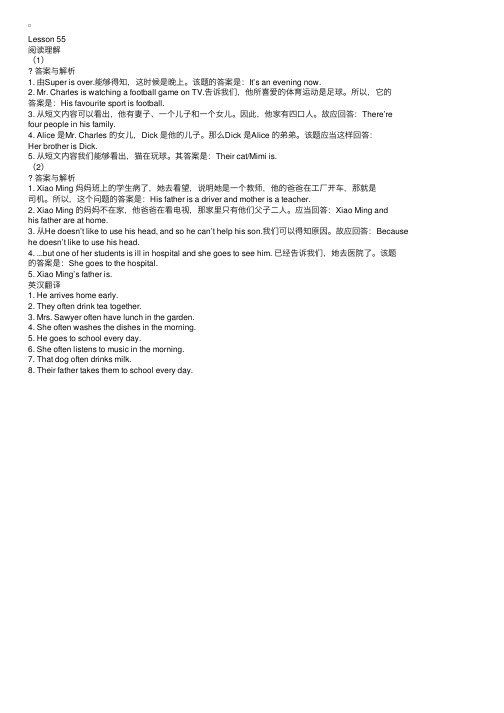
Lesson 55阅读理解(1)答案与解析1. 由Super is over.能够得知,这时候是晚上。
该题的答案是:It’s an evening now.2. Mr. Charles is watching a football game on TV.告诉我们,他所喜爱的体育运动是⾜球。
所以,它的答案是:His favourite sport is football.3. 从短⽂内容可以看出,他有妻⼦、⼀个⼉⼦和⼀个⼥⼉。
因此,他家有四⼝⼈。
故应回答:There’re four people in his family.4. Alice 是Mr. Charles 的⼥⼉,Dick 是他的⼉⼦。
那么Dick 是Alice 的弟弟。
该题应当这样回答:Her brother is Dick.5. 从短⽂内容我们能够看出,猫在玩球。
其答案是:Their cat/Mimi is.(2)答案与解析1. Xiao Ming 妈妈班上的学⽣病了,她去看望,说明她是⼀个教师,他的爸爸在⼯⼚开车,那就是司机。
所以,这个问题的答案是:His father is a driver and mother is a teacher.2. Xiao Ming 的妈妈不在家,他爸爸在看电视,那家⾥只有他们⽗⼦⼆⼈。
应当回答:Xiao Ming andhis father are at home.3. 从He doesn’t like to use his head, and so he can’t help his son.我们可以得知原因。
故应回答:Because he doesn’t like to use his head.4. ...but one of her students is ill in hospital and she goes to see him. 已经告诉我们,她去医院了。
该题的答案是:She goes to the hospital.5. Xiao Ming’s father is.英汉翻译1. He arrives home early.2. They often drink tea together.3. Mrs. Sawyer often have lunch in the garden.4. She often washes the dishes in the morning.5. He goes to school every day.6. She often listens to music in the morning.7. That dog often drinks milk.8. Their father takes them to school every day.。
新概念英语第一册55课课文原文
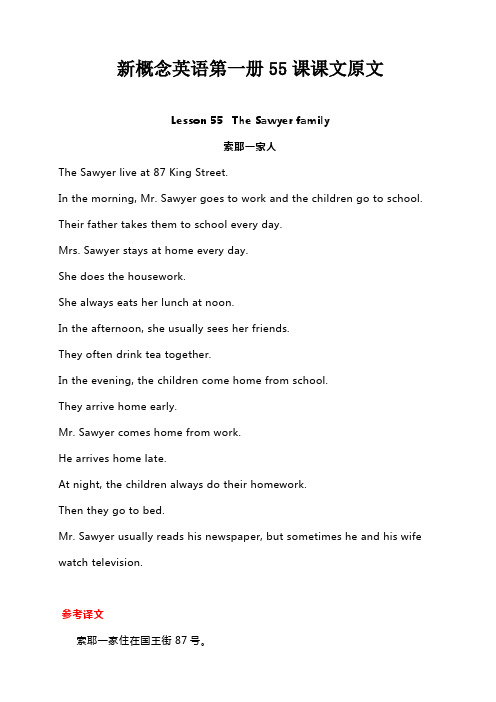
新概念英语第一册55课课文原文Lesson 55 The Sawyer family索耶一家人The Sawyer live at 87 King Street.In the morning, Mr. Sawyer goes to work and the children go to school. Their father takes them to school every day.Mrs. Sawyer stays at home every day.She does the housework.She always eats her lunch at noon.In the afternoon, she usually sees her friends.They often drink tea together.In the evening, the children come home from school.They arrive home early.Mr. Sawyer comes home from work.He arrives home late.At night, the children always do their homework.Then they go to bed.Mr. Sawyer usually reads his newspaper, but sometimes he and his wife watch television.参考译文索耶一家住在国王街87号。
早上,索耶先生去上班,孩子们去上学。
父亲每天送孩子们去上学。
索耶夫人每天呆在家里。
她料理家务。
她总是在正午吃午饭。
下午,她总是会见她的朋友。
她们经常在一起喝茶。
傍晚,孩子们放学回家。
他们到家很早。
索耶先生下班回家。
他到家很晚。
晚上,孩子们总是做作业,然后去睡觉。
索耶先生总是读报纸,但有时和他的妻子一起看电视。
新概念英语第一册第55课
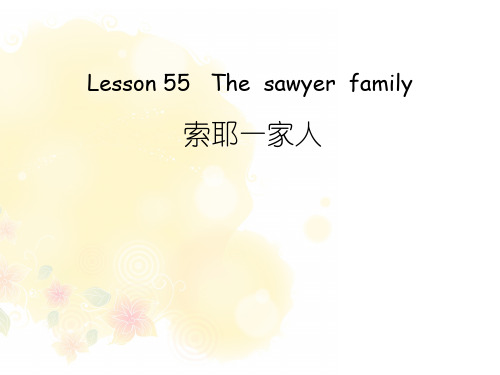
lunch
早餐
breakfast 晚饭 supper
n.
n.
午饭
n.
吃早餐/午饭/晚饭
have breakfast/ lunch /supper
afternoon
n. 下午
morning /evening 早上/晚上 在早上/中午/晚上 In the morning/afternoon/ evening
Language points
1.the Sawyers
the + 姓氏+ s = the + 姓氏 + family
2.go to work \ school \bed \ hospital 3.take sb to sp e home from school \ work 5.arrive home early \ late 6.read a newspaper 7.watch television \ TV
home n. 家 ;adv. 住家,到家 1) n. 家 欢迎来我家 eg: Welcome to my home . 在家 at home 呆在家 stay at home 她总是呆在家 eg: She always stays at home. 2)adv. 住家,到家(副词前不能加介词) 3)回家 4)go home 到家 come home 她经常到家很晚。 eg: she always comes home late. housework n. 家务 做家务 do the housework 家庭主妇 housewife
⑧do their homework
What do\does+someone+(频率副词)+do+时间状语? 某人通常在某个时间做什么? 他们早晨通常做什么?
新概念英语第一册lesson 55 The Sawyer family讲课讲稿
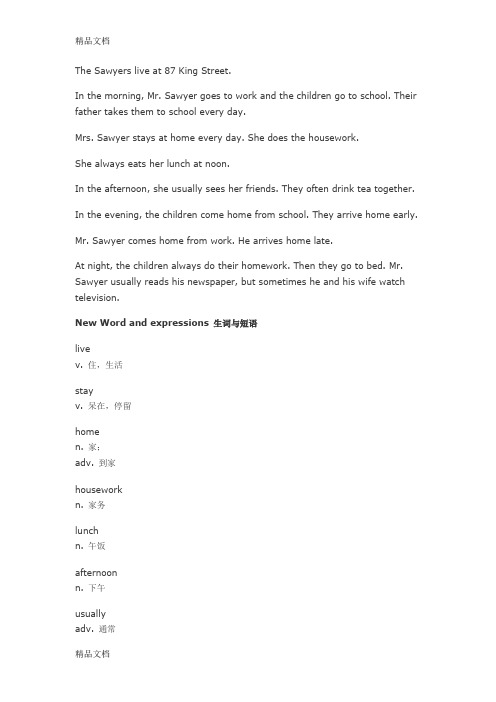
The Sawyers live at 87 King Street.In the morning, Mr. Sawyer goes to work and the children go to school. Their father takes them to school every day.Mrs. Sawyer stays at home every day. She does the housework.She always eats her lunch at noon.In the afternoon, she usually sees her friends. They often drink tea together.In the evening, the children come home from school. They arrive home early.Mr. Sawyer comes home from work. He arrives home late.At night, the children always do their homework. Then they go to bed. Mr. Sawyer usually reads his newspaper, but sometimes he and his wife watch television.New Word and expressions 生词与短语livev. 住,生活stayv. 呆在,停留homen. 家;adv. 到家houseworkn. 家务lunchn. 午饭afternoonn. 下午usuallyadv. 通常togetheradv. 一起eveningn. 晚上arrivev. 到达nightn. 夜间本文参考译文索耶一家住在国王街87号。
早上,索耶先生去上班,孩子们去上学。
Lesson55TheSawyerFamily(课件)新概念英语第一册

stay with sb. 和某人待在一起
③ home [həʊm]
eg: go home 回家
adv. 在家 n. 家
④ housework [ˈhaʊsˌwɜːk]
n. 家务
eg: My father is doing housework now.
拓展: housework 家务(不可数名词)
n. 晚上
[ˌɑːftə'nuːn]
n. 下午
Words reviewing
• l_v_ • st_ _ • h_m_ • h_ _ sew_ _k • l_ _ ch
• _s_ally • t_ gethe_ • _v_ning • _rr_v_
• aftern_ _ n
• n_ght
Text learning
Words reading
[lɪv]
v. 生活
[steɪ]
v. 待在,停留
[həʊm]
adv. 在家 n. 家
[ˈhaʊsˌwɜːk]
n. 家务
[lʌntʃ]
n. 午餐
ቤተ መጻሕፍቲ ባይዱ
[ˈjuːʒʊəlɪ]
adv. 通常
[təˈɡeðə]
adv. 一起
['iːvnɪŋ]
n. 傍晚
[ə'raɪv]
v. 到达
[naɪt]
Mrs. Lawyer stays at home every day.
She does the housework.
主谓一致,三 单形式
索耶太太每天待在家里做家务。
She always eats her lunch at noon.
stay at+ 地点 housework [U]n 家务
- 1、下载文档前请自行甄别文档内容的完整性,平台不提供额外的编辑、内容补充、找答案等附加服务。
- 2、"仅部分预览"的文档,不可在线预览部分如存在完整性等问题,可反馈申请退款(可完整预览的文档不适用该条件!)。
- 3、如文档侵犯您的权益,请联系客服反馈,我们会尽快为您处理(人工客服工作时间:9:00-18:30)。
3
Mrs Sawyer-home- every day - housework
4
She- eats- lunch- noon
5
afternoon-she – sees- friends drink tea- together
6
evening-children- home – school they-home- early
Homework
1.Recite the whole lesson 2.Review the lesson 57 and lesson 58
1
The Sawyers87 King Street
2
morning- Mr. Sawyer-work Children- school Their father- school- every day.
In the evening, the children come home from school. They arrive home early.
7
Mr Sawyer comes home from work. He arrives home late.
8
night /naIt/
n.夜间
At night, the children always do their homework. Then they go to bed. Mr. Sawyer usually reads his newspaper, but sometimes he and his wife watch television.
住,生活 live
家务 家
午饭 下午
housework
home lunch
afternoon
呆在,停留 stay
通常 到达
usually
arrive
together night evening
一起
夜间 晚上
Look at the short video and then answer this question.
When do the Children do their homework ?
The sawyer family
1
live
/lI v/
v.住, 生活
live in/ live at
表达地址时,在具体的门牌号前用at,在城市或者街名前用in。
在姓氏后加s,前面加上定冠词the,表示某某一家人。
The Sawyers live at 87 King Street.
• •
• • • • •
Say something about your family Answer these questions with the help of these questions Where are you from? How many people are there in your family? Who are they? How old is your father/mother ? What does your father/mother do? What do you do after school everyday? What do your parents do after work everyday?
the Smiths live in Beijing live in King Street
2
in the morning
go to work
go to shool
take sb. to sp.
In the morning, Mr. Sawyer goes to work and the children go to school. Their father takes them to school every day.
7
Mr Sawyer- home- work arrives-late
8
night-children – homework they-bed Mr Sawyer – newspaper sometimes -television
1. live [ lɪv] v. eg. 1) The Sawyers live at 87 King Street. 索耶一家住在国王街87号。 2) 李明住在北京。 Li Ming lives in Beijing. 3) Live and learn. 活到老,学到老
2.arrive
eg. They arrive home early. 他们到家很早。 in sp (big) arrive at sp (small)
{
eg.1) 这架飞机5点抵达伦敦。
The plane arrived in London at 5 o’clock. 2) 我们三点到了火车站。 We arrived at the station at 3 o’clock.
stay /steI/ v.呆在, 停留 home
n.家
3
stay at home
do housework
housework /'hausw3:k/
/hEu adv.在家,到家 n.家务 m/ Mrs Sawyer stays at home every day.
She does the housework.
Choose the one you like best
1
2
3
4
5
6
7
8
Mrs Sawyer goes to work and the children go to school.
Grammar
The third person singular(单数第三人称) The subjec(主语) :
he/she/it Mary /Tom/my father /my brother the cat/the girl/the boy…
The predicate verb(谓语动词): verb→verb+-ssh)________the dishes every day. Exercise go 1.The children (go)_____to school in the moring. 2.Their father (take) takes _____them to school. stays 3.Mrs. Sawyer (stay) ______at home. does 4.She (do) _____the housework. eats 5.She always (eat)____ her lunch at noon.
4
lunch /lVntS/
n.午饭
have (one's) lunch
eat (one's) lunch
She always eats her lunch at noon.
midday
usually /'ju:ZuElI/adv.通常 together afternoon /tE'geD /;A:ftE'nu: E/ adv.一起 n.下午 n/
In the afternoon, she usually sees her friends. They often drink tea together.
5
6
evening /'i:vnIN n.晚上 / arrive at+小地方 arrive /E'raIv/ v.到达
arrive in+大地方
